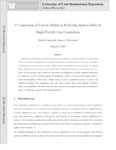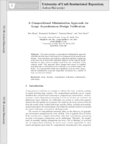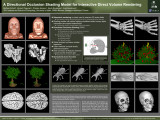Filters: Format: "application/pdf" School Or College: "College of Engineering" Collection: "ir_uspace"
| Creator | Title | Description | Subject | Date | ||
|---|---|---|---|---|---|---|
| 26 |
 |
Evans, John; Kessler, Robert R. | A communication-ordered task graph allocation algorithm | The inherently asynchronous nature of the data flow computation model allows the exploitation of maximum parallelism in program execution?? While this computational model holds great promise several problems must be solved in order to achieve a high degree of program performance?? The allocation... | Data flow computation model | 1992 |
| 27 |
 |
Furse, Cynthia M. | A comparative study on two types of transparent patch antennas | Properties of optically transparent patch antennas designed from meshed conductor and transparent conductive films are studied and compared. It is shown that at S band, meshed antenna provides the best antenna efficiency for the highest transparency. It is practical to design a 90% transparent mesh... | 2011 | |
| 28 |
 |
McDirmid, Sean; Eide, Eric Norman; Hsieh, Wilson C. | A comparison of Jiazzi and AspectJ for feature-wise decomposition | Feature-wise decomposition is an important approach to building configurable software systems. Although there has been research on the usefulness of particular tools for featurewise decomposition, there are not many informative comparisons on the relative effectiveness of different tools. In this... | Jiazzi; AspectJ; Feature-wise decomposition | 2004-03-23 |
| 29 |
 |
Brunvand, Erik L. | A comparison of modular self-timed design styles | State-machine sequencing methods in modular 2-phase and 4-phase asynchronous handshake control are compared. Design styles are discussed, and the sequencers are tested against each other using a medium-scale minicomputer test design implemented in FPGAs. Seven 4-phase sequencers are tested. In these... | Self-timed; State-machine sequencing; Asynchronous handshake control | 1995 |
| 30 |
 |
Zhang, Lixin | A comparison of online superpage promotion mechanisms | The amount of data that a typical translation lookaside buffer (TLB) can map has not kept pace with the growth in cache sizes and application footprints. As a result, the cost of handling TLB misses limits the performance of an increasing number of applications. The use of superpages, multiple adjac... | Superpages; Translation lookaside buffer; TLB | 1999 |
| 31 |
 |
Brunvand, Erik L.; Smith, Kent F. | A comparison of self-timed design using FPGA, CMOS, and GaAs technologies | Asynchronous or self-timed systems that do not rely on U global clock to keep system components synchronized can offer significant advantages over traditional clocked circuits in a variety of applications. One advantage is that because of the separation of timing, from, functionality in these sys... | 1992 | |
| 32 |
 |
Carter, John B. | A comparison of software and hardware synchronization mechanisms for distributed shared memory multiprocessors | Efficient synchronization is an essential component of parallel computing. The designers of traditional multiprocessors have included hardware support only for simple operations such as compare-and-swap and load-linked/store-conditional, while high level synchronization primitives such as locks, bar... | Hardware locks | 1996 |
| 33 |
 |
Sutherland, James Clayton | A comparison of various models in predicting ignition delay in single-particle coal combustion | In this paper, individual coal particle combustion under laminar conditions is simulated using models with various levels of complexity for the particle and gas phase chemical kinetics. The mass, momentum and energy governing equations are fully coupled between the particle and the gas phase. In the... | 2014-01-01 | |
| 34 |
 |
Myers, Chris J. | A compositional minimization approach for large asynchronous design verification | This paper presents a compositional minimization approach with efficient state space reductions for verifying non-trivial asynchronous designs. These reductions can result in a reduced model that contains the exact same set of observably equivalent behavior in the original model, therefore no false ... | 2012-01-01 | |
| 35 |
 |
Gopalakrishnan, Ganesh | A compositional model for synchronous VLSI systems | Currently available hardware specification languages have two serious deficiencies: (i) inadequate protocol definition capabilities; (ii) lack of a compositional model. We now explain these in more detail. | Very large scale integration; VLSI systems | 1987 |
| 36 |
 |
Henderson, Thomas C. | A control paradigm for general purpose manipulation systems | Mechanical end effectors capable of dextrous manipulation are now a reality. Solutions to the high level control issues, however, have so far proved difficult to formulate. We propose a methodology for control which produces the functionality required for a general purpose manipulation system. It is... | Manipulation systems | 1987 |
| 37 |
 |
Brunvand, Erik L. | A correctness criterion for asynchronous circuit validation and optimization | In order to reason about the correctness of asynchronous circuit implementations and specifications, Dill has developed a variant of trace theory [1]. Trace theory describes the behavior of an asynchronous circuit by representing its possible executions as strings called "traces" A useful relatio... | Asynchronous circuits; Circuit optimizations; Formal verification of hardware; Trace theory; Asynchronous circuit validation | 1992 |
| 38 |
 |
Gopalakrishnan, Ganesh | A correctness criterion for asynchronous circuit validation and optimization | We propose a new relation C. called strong conformance in the context of Dill's trace theory, and define B Q A to be true exactly when B conforms to A and the success set of B contains the success set of A. When B C. A, module B operated in module A's maximal environment AM (i.e. B || AM) exhibits a... | Validation; Optimization | 1992 |
| 39 |
 |
Roundy, Shadrach J. | A cost-effective planar electromagnetic energy harvesting transducer | This paper presents a planar multi-pole electromagnetic energy harvesting transducer. We report on the design, manufacture, and performance results of integrated devices based on this transducer. The transducer leverages recent advancements in the manufacture of multi-pole magnets and can be impleme... | 2012-01-01 | |
| 40 |
 |
Barsky, Brian A. | A description of several tools for the synchronization of concurrent processes | Concurrent processes are tasks which may be executed simultaneously. When several such processes have access to shared variables, it is necessary to establish some regimen to control this access. Several language tools for expressing various synchronization disciplines are presented. | Concurrent processes | 1980 |
| 41 |
 |
Schott, Mathias; Hansen, Charles D | A directional occlusion shading model for interactive direct volume rendering | Volumetric rendering is widely used to examine 3D scalar fields Key aspect: provide perceptual cues to aid in understanding the data set Shading models with natural lighting conditions better convey depth information and spatial relationships Traditionally require considerable (pre)computatio... | ||
| 42 |
 |
A distributed garbage collection algorithm | Concurrent Scheme extends the Scheme programming language, providing parallel program execution on a distributed network. The Concurrent Scheme environment requires a garbage collector to reclaim global objects; objects that exist in a portion of the global heap located on the node that created them... | Concurrent Scheme; Garbage collection algorithm | 1992 | |
| 43 |
 |
Evans, John | A distributed object-oriented graphical programming system | This report presents the design of a distributed parallel object system (DPOS) and its implementation using a graphical editing interface. DPOS brings together concepts of object-oriented programming and graphical programming with aspects of modern functional languages. Programs are defined as netwo... | Distributed parallel object system; DPOS | 1990 |
| 44 |
 |
Mecklenburg, Robert | A dossier driven persistent objects facility | We describe the design and implementation of a persistent object storage facility based on a dossier driven approach. Objects are characterized by dossiers which describe both their language defined and "extra-linguistic" properties. These dossiers are generated by a C+-f- preprocessor in concert ... | Persistent object storage facility; Dossier driven | 1994 |
| 45 |
 |
Zhang, Lixin | A DRAM backend for the impulse memory system | The Impulse Adaptable Memory System exposes DRAM access patterns not seen in conventional memory systems. For instance, it can generate 32 DRAM accesses each of which requests a four-byte word in 32 cycles. Conventional DRAM backends are optimized for accesses that request full cache lines. They m... | Impulse Adaptable Memory System; DRAM | 1998-12-16 |
| 46 |
 |
Sobh, Tarek M. | A dynamic framework for intelligent inspection | CAD (Computer Aided Design) typically involves the design, manufacture and inspection of a mechanical part. The problem of reverse engineering is to take an existing mechanical part as the point of departure and to inspect or produce a design, and perhaps a manufacturing process, for the part. We pr... | CAD; Discrete event dynamic systems; DEDS | 1992 |
| 47 |
 |
Sobh, Tarek M.; Henderson, Thomas C. | A dynamic framwork for intelligent inspection | CAD Computer Aided Design typically involves the design manufacture and inspection of a me chanical part. The problem of reverse engineering is to take an existing mechanical part as the point of departure and to inspect or produce a design and perhaps a manufacturing process for the part. ... | CAD; Manufacture; Inspection; Intelligent inspection | 1992 |
| 48 |
 |
Sobh, Tarek M.; Henderson, Thomas C. | A dynamic recursive structure for intelligent exploration | We suggest a new approach for inspection and reverse engineering applications. In particular, we investigate the use of discrete event dynamic systems (DEDS) to guide and control the active exploration and sensing of mechanical parts for industrial inspection and reverse engineering. We introduce dy... | Intelligent exploration; Discrete event dynamic systems; DEDS; Dynamic recursive finite state machines; DRFSM | 1992 |
| 49 |
 |
Sobh, Tarek M.; Henderson, Thomas C. | A dynamic recursive structure for intelligent inspection | We suggest a new approach for inspection and reverse engineering applications. In particular we investigate the use of discrete event dynamic systems DEDS to guide and control the active exploration and sensing of mechanical parts for industrial inspection and reverse engineering?? We introduce... | Intelligent inspection; Discrete event dynamic systems; DEDS; Industrial inspection; Dynamic recursive structure | 1992 |
| 50 |
 |
Whitaker, Ross T. | A fast iterative method for a class of Hamilton-Jacobi equations on parallel systems | In this paper we propose a novel computational technique, which we call the Fast Iterative Method (FIM), to solve a class of Hamilton- Jacobi (H-J) equations on massively parallel systems. The proposed method manages the list of active nodes and iteratively updates the solutions on those nodes u... | Fast Iterative Method; FIM; Parallel systems | 2007 |
